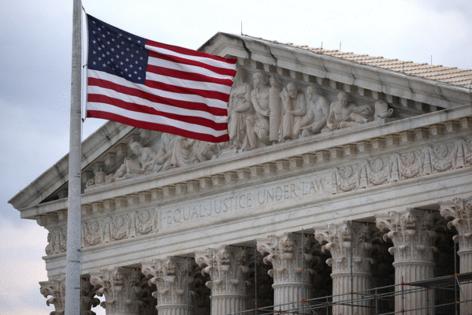Supreme Court, ruling for Trump, says criminal migrants may be deported to South Sudan
Published in News & Features
WASHINGTON — The Supreme Court said Monday the Trump administration may deport criminal migrants to South Sudan or Libya even if those countries are deemed too dangerous for visitors.
By a 6-3 vote, the conservative majority set aside the rulings of a Boston-based judge who said the detained men deserved a "meaningful opportunity" to object to being sent to a strange country where they may be tortured or abused.
The court issued an unsigned order with no explanation.
Justice Sonia Sotomayor wrote a 19-page dissent and was joined by Justices Elena Kagan and Ketanji Brown Jackson.
"In matters of life and death, it is best to proceed with caution. In this case, the Government took the opposite approach," she said. "I cannot join so gross an abuse of the Court's equitable discretion."
Last month, the government put eight criminal migrants on a military plane bound for South Sudan.
"All of these aliens had committed heinous crimes in the United States, including murder, arson, armed robbery, kidnapping, sexual assault of a mentally handicapped woman, child rape, and more," Trump's Solicitor Gen. D. John Sauer told the court. They also had a "final order of removal" from an immigration judge.
But U.S. District Judge Brian Murphy in Boston said the flight may have defied an earlier order because the men were not given a reasonable chance to object. He said the Convention Against Torture gives people protection against being sent to a country where they may be tortured or killed.
He noted the U.S. State Department had warned Americans: "Do not travel to South Sudan due to crime, kidnapping and armed conflict."
Sauer said this case was different from others involving deportations because it dealt with the "worst of the worst" among immigrants in the country without authorization. He said these immigrants were given due process of law because they were convicted of crimes and were given a "final order of removal."
However, their native country was unwilling to take them.
"Many aliens most deserving of removal are often the hardest to remove," he told the court. "As a result, criminal aliens are often allowed to stay in the United States for years on end, victimizing law-abiding Americans in the meantime."
Immigration and Customs Enforcement said the plane landed at a military base in Djibouti.
In April, Murphy said "this presents a simple question: before the United States forcibly sends someone to a country other than their country of origin, must that person be told where they are going and be given a chance to tell the United States that they might be killed if sent there?"
He said the plaintiffs were "seeking a limited and measured remedy ... the minimum that comports with due process."
©2025 Los Angeles Times. Visit at latimes.com. Distributed by Tribune Content Agency, LLC.







Comments